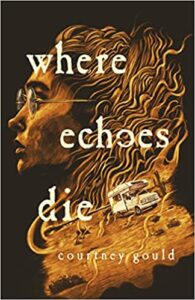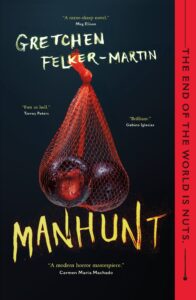Grief is one of the most popular themes explored within the horror genre. From TV, to film, to literature, death is one of the human experiences that vexes us the most, and people use art and media to grapple with the aspects of our existence that are completely out of our control. I have watched a ton of movies and read a lot of books that were either centered around or touched upon the experience of grief, and it remains one of my favourite topics to explore within the horror genre. However, considering how outstanding so many of these have been, I have also come to develop very high expectations for works of art that tackle grief, and an author really has to address the topic creatively to pique my interest.
Courtney Gould’s debut novel, The Dead and the Dark, has been, for a couple of years now, one of my favourite books. I have recommended it every chance I have had, and I will always hold it very dear to my heart. So, I was incredibly nervous about picking up her second release, Where Echoes Die. Not only did it seem impossible for another story to affect me quite as much as The Dead and the Dark, but I also knew it would, to a certain extent, discuss the experience of grief and death. There was so much that could go wrong, and I was fully expecting myself to be, at least somewhat, disappointed. Thankfully, Gould not only met but surpassed those expectations, and her talent grew so exponentially from one book to another, my jaw was on the floor by the end of the novel.
Where Echoes Die is the story of Beck, who travels to a small town in Arizona with her younger sister to investigate its connection to their mother’s death. She’s been adrift since her mother’s passing, unable to stop herself from slipping into memories of happier times. In the isolated community of Backravel, Beck tries to understand what drew her mother to this place, all while desperately trying to hold onto the way things used to be. She soon discovers, however, that there is something off about the town and its people. And while she finds herself getting closer to the daughter of the community’s leader, Avery, Beck must uncover the town’s secrets before her or her sister get hurt… or before she loses herself completely.
This was such a fascinating and interesting take on grief. Gould breaks it down and explores every single facet of dealing with death: what it means to feel unable to move on, to always hold onto the past, the way your grief can affect those around you, and the way it can affect you in ways you don’t even realize. The relationships in this story are so interesting, and the book really explores not only those specific dynamics, but also the way they shift other relationships, and how that shift changes over time—either for better or for worse. Complex family dynamics in fiction will always make me emotional, and the mother-daughter relationship was particularly well-executed here. That balance between making your reader understand the love that a child has for a parent, while also empathizing with the trauma to which they’ve been victim and conceptualizing the extent to which it affected them is something that takes real talent to be able to execute correctly, and Gould does exactly that. The relationship between the sisters was also so well woven into the plot and the main character’s journey, and it added such an impressive extra layer to the overall family dynamic.
Grief is all-encompassing and can make a person suffer through feelings of anxiety, claustrophobia, loss of control, desperation. This novel forces you to experience every single one of those emotions, and more. It is so affective, and in such a masterfully subtle way, you don’t even realize how tense it makes you feel until you take a break or set the book down.
To say that this made me cry would be a terrible understatement. I sobbed. I was distraught. I think that my neighbours were concerned about the wails floating through the walls of my building as I, myself, grieved with all the characters in the story, and I would give the world to be able to relive those last few chapters for the first time all over again.
Although this may seem counterintuitive to some people, whether or not a horror novel actually terrified me is not a main criterion in the scale I use to rate a book. It’s always a fun bonus, but I’ve developed some pretty thick skin and the genre is so much more complex than just pure fear factor. That being said, this was truly unnerving. The unsettling feeling that persisted throughout the whole story was a pleasant surprise and an improvement, I believe, from The Dead and the Dark, which was maybe not quite as frightening. Gould really captured the terror of not being in control of yourself or your environment and feeling unsure about everything happening around you.
Finally, I want to thank Gould for consistently using the world “lesbian” in the text of all of her novels. Authors regularly opt for other terms such as “sapphic” or “queer” or “gay”, even when referring to a character that is clearly and specifically a lesbian. And while there are a ton of reasons for an author to utilize different terminology, as a lesbian reader and book reviewer, it is such a wonderful feeling to see the word actually used on-page. While queerness isn’t quite as central in Where Echoes Die as it was in The Dead and the Dark, there is a sapphic romance that is significant to the plot itself, and the main character does openly specify that she is a lesbian—which was once again such a validating moment.
Even if you have no personal relationship with grief, you will be fully enthralled by this story and it will take you through a cathartic, emotional rollercoaster like never before. I wholeheartedly recommend it; it is an amazing example of the depth of the horror genre and just how much substance an author can include within one singular storyline.
Representation: lesbian main character, sapphic love interest
Content warnings: death of a parent/death of a loved one, emotional abuse, gaslighting, emetophobia/vomiting


